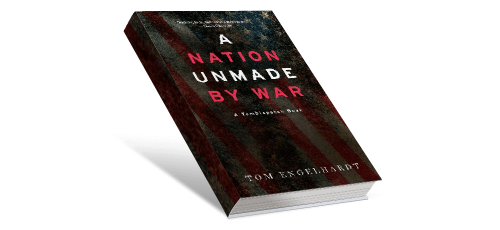
Nation (Un)Building and Planet (Un)Building, American-Style
Tom Engelhardt
Let me start 2022 by heading back — way, way back — for a moment.
It’s easy to forget just how long this world has been a dangerous place for human beings. I thought about this recently when I stumbled upon a little memoir my Aunt Hilda scrawled, decades ago, in a small notebook. In it, she commented in passing: “I was graduated during that horrible flu epidemic of 1919 and got it.” Badly enough, it turned out, to mess up her entry into high school. She says little more about it.
Still, I was shocked. In all the years when my father and his sister were alive and, from time to time, talked about the past, never had they (or my mother, for that matter) mentioned the disastrous “Spanish Flu” pandemic of 1918-1920. I hadn’t the slightest idea that anyone in my family had been affected by it. In fact, until I read John Barry’s 2005 book, The Great Influenza, I hadn’t even known that a pandemic devastated America (and the rest of the world) early in the last century — in a fashion remarkably similar to, but even worse than, Covid-19 (at least so far) before essentially being tossed out of history and the memory books of most families.
That should stun anyone. After all, at that time, possibly 50 million people died of the waves of that dreaded disease, often in horrific ways, and, even in this country, were sometimes buried in mass graves. Meanwhile, some of the controversies we’ve experienced recently over, for instance, masking went on in a similarly bitter fashion then, before that global disaster was chucked away and forgotten. Almost no one I know whose parents lived through that nightmare had heard anything about it while growing up.
